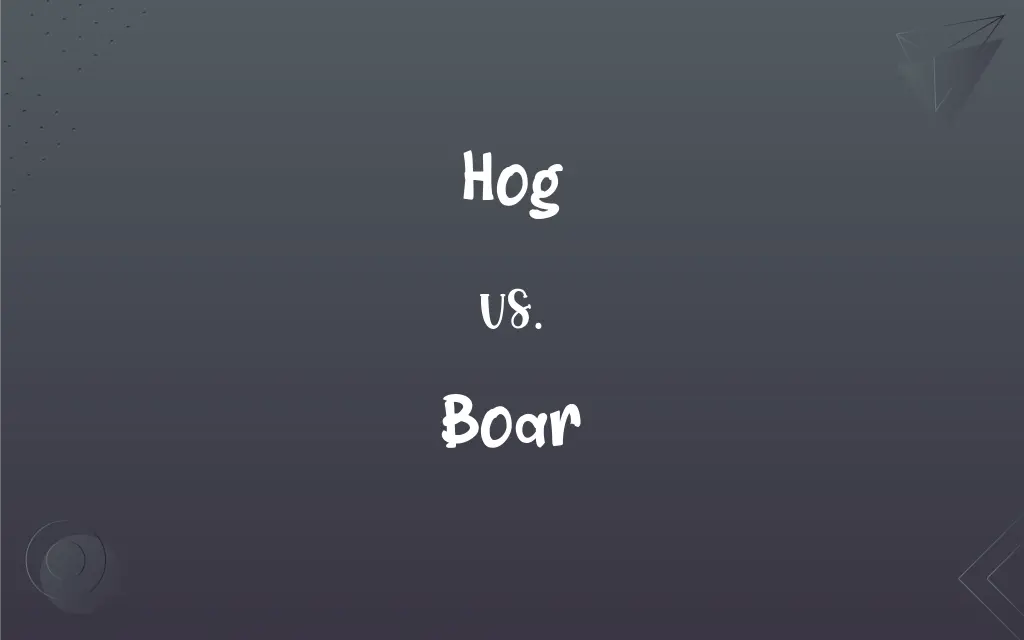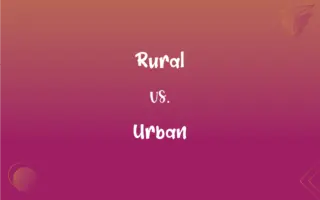Hog vs. Boar: What's the Difference?
Edited by Janet White || By Harlon Moss || Updated on October 26, 2023
A hog is a domesticated pig raised for meat, while a boar is a wild or male pig of any age.

Key Differences
Hog and boar, both terms related to pigs, carry distinct meanings and connotations. A hog is generally referred to as a domesticated pig, especially one that's raised for meat purposes. On the flip side, a boar denotes a wild pig of any species, or more specifically, a male pig of any age. The term hog often suggests farming or agricultural settings, considering its domesticated nature. Boar, however, evokes images of wild terrains and uncharted forests where these creatures roam freely.
Diving deeper into the agricultural sector, the term hog is ubiquitously used to describe swine raised for consumption. These animals are carefully bred, nurtured, and eventually sent to slaughterhouses. Boar, in a more specific sense apart from its wild connotation, implies a male swine. This distinction is crucial, especially in breeding contexts, where the difference between male (boar) and female (sow) is essential.
From a linguistic standpoint, the term hog is more flexible. It can be employed colloquially to mean 'to selfishly take or hoard' (like "hogging the remote"), making its usage broader than just the realm of agriculture. In contrast, boar remains tightly knit to its zoological context, rarely drifting into other metaphorical applications.
While both terms, hog and boar, have their roots in the pig family, understanding their nuanced differences is vital. From domesticated farm settings to wild terrains and from culinary contexts to breeding specifics, these words occupy different spaces in the English lexicon.
Comparison Chart
Definition
Domesticated pig
Wild pig or male pig of any age
ADVERTISEMENT
Common Context
Agricultural, raised for meat
Wild environments or breeding contexts
Gender Specificity
No
Yes, when referring to male pigs
Linguistic Flexibility
Can be used colloquially (e.g., "hogging the remote")
Primarily zoological
Domestication
Yes
No, unless referring to the male gender of domesticated pigs
Hog and Boar Definitions
Hog
A hog is typically larger and heavier than other swine.
That hog weighs over 300 pounds!
ADVERTISEMENT
Boar
Boars have longer, sharper tusks compared to domesticated pigs.
The boar's tusks can be quite dangerous.
Hog
The term hog can imply selfishly taking or hoarding.
Don't hog all the cookies!
Boar
Boars are often considered more aggressive than hogs.
Approach a wild boar with caution.
Hog
Hog refers to a domesticated pig.
The farm has 50 hogs ready for sale.
Boar
Boar can also denote a male pig of any age.
The farmer purchased a new boar for breeding.
Hog
Hog is an animal raised mainly for meat.
We will butcher the hog next week.
Boar
Boar describes a wild pig of any species.
A boar was spotted in the forest yesterday.
Hog
Hogs are commonly associated with farming.
The hog pen needs cleaning.
Boar
The term boar is rooted deeply in zoological contexts.
Boar hunting is a popular sport in some countries.
Hog
Any of various mammals of the family Suidae, which includes the domesticated pig as well as wild species, such as the wild boar and the warthog.
Boar
The wild boar.
FAQs
What is a hog primarily used for?
A hog is primarily raised for meat in agricultural settings.
Can the term hog refer to any domesticated pig?
Yes, hog commonly refers to a domesticated pig, especially one raised for meat.
Is hogging a term derived from hog?
Yes, "hogging" colloquially means to selfishly take or hoard, derived from the term hog.
Is there a female counterpart to the term boar?
Yes, the female pig is often referred to as a sow.
Does boar refer only to wild pigs?
Not always. While boar can mean a wild pig, it also denotes a male pig of any age.
How are hogs typically raised?
Hogs are usually raised in farms or agricultural settings for meat.
Is every hog a pig?
Yes, a hog is a type of pig, specifically one raised for meat.
Are boars more aggressive than hogs?
Wild boars tend to be more aggressive due to their need to survive in the wild, whereas hogs are domesticated.
Do boars have tusks?
Yes, boars have longer, sharper tusks compared to domesticated pigs.
Which is larger, a hog or a boar?
Size can vary, but typically, a domesticated hog might be larger due to controlled feeding, while wild boars might be leaner.
Are boars and hogs different species?
No, they belong to the same species but differ in terms of domestication and, sometimes, gender.
What do boars eat in the wild?
Boars are omnivores, consuming a diet of plants, fruits, and even small animals.
What's the main difference between a hog and a boar?
A hog is a domesticated pig raised for meat, while a boar refers to a wild pig or a male pig.
Are boar tusks dangerous?
Yes, boar tusks can be sharp and dangerous, especially in the wild.
Can the term boar refer to a domesticated male pig?
Yes, boar can also refer to a male pig in a domestic setting, not just wild ones.
Is the meat from a hog and a boar different?
Yes, wild boar meat is often leaner and has a stronger, gamey flavor compared to domestic hog meat.
Is a boar typically wild?
Yes, a boar often refers to a wild pig, though it can also mean a male pig.
Do hogs live in the wild?
Hogs are typically domesticated, but feral hogs, which have escaped and live in the wild, do exist.
Is the term hog used outside of farming contexts?
Yes, it's used colloquially to mean selfishly taking something, like "hogging the spotlight."
Do hogs have tusks?
Domesticated hogs generally don't have prominent tusks like wild boars.
About Author
Written by
Harlon MossHarlon is a seasoned quality moderator and accomplished content writer for Difference Wiki. An alumnus of the prestigious University of California, he earned his degree in Computer Science. Leveraging his academic background, Harlon brings a meticulous and informed perspective to his work, ensuring content accuracy and excellence.
Edited by
Janet WhiteJanet White has been an esteemed writer and blogger for Difference Wiki. Holding a Master's degree in Science and Medical Journalism from the prestigious Boston University, she has consistently demonstrated her expertise and passion for her field. When she's not immersed in her work, Janet relishes her time exercising, delving into a good book, and cherishing moments with friends and family.































































